Alexander Isak: The Newcastle signing shaking off his 'new' Zlatan Ibrahimovic tag
- Published
- comments

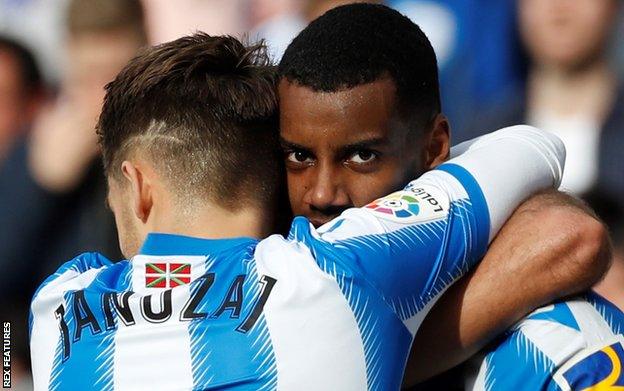
Isak's superb recent form for Real Sociedad has caught the eye - and seen his value rocket
A version of this article was first published in March 2020.
It was probably the most successful 17th birthday in football history.
The big Stockholm derby between Djurgarden and AIK was on 21 September 2016, and Alexander Isak made sure it was an evening to remember.
In the first half, AIK's teenage sensation made a run into space and expertly controlled a through ball in the box. One touch to take it into his stride, a second to fire low and hard into the far corner. Arms outstretched, he stood celebrating in front of the hostile home crowd.
After the break, he stole into a scoring position with perfect timing and added a brilliant header, doubling the lead and sending his club's fans wild with joy. That night AIK celebrated an emphatic 3-0 win over bitter rivals that kept their championship title dream alive.
Chinedu Obasi, the Nigerian who netted the third goal, said: "Isak has enormous potential. If everything goes well, he could become Sweden's new Zlatan Ibrahimovic."
The comparison has stuck. That's how the Spanish press described Isak a few months later in January 2017, when he appeared close to joining Real Madrid. Those reports proved to be wrong, and Isak instead moved to Borussia Dortmund. He finally arrived in La Liga with Real Sociedad - and that same old nickname was repeated like never before.
Isak made a big impact. One of his most spectacular performances in his inaugural season came at Real Madrid in early February - where the club from San Sebastian triumphed 4-3 in the Spanish Cup. Isak scored twice and assisted another.
Just three days later, he came on as a second-half substitute, assisted again and got the late winner in a 2-1 derby victory over Athletic Bilbao, scoring for a sixth game in a row.
As he arrives in the Premier League with Newcastle, three successful seasons in Spain and a £60m price tag suggest the 22-year-old is set to be a major star for years to come.
He is tall, prolific, and blessed with magnificent technical ability. In a way, his skillset is comparable to Ibrahimovic's. But in terms of their personalities and playing style, the comparison is totally wrong. Actually, they couldn't be more different.

"We had a special bond, because we are both of Eritrean origin", says Nahom Ghidey, who coached Isak at AIK from when he was 10 to when he was 13.
"Alexander's parents came to Stockholm in the 1980s because of the long civil war, and he grew up as a Swede but was always close to Eritean culture.
"Eritreans are proud, strong and patriotic people, and that background was influential. His father, Teame, is a teacher and Alexander has always received a lot of love and support from his family.
"I'm certain that the unique mixture of Swedish and Eritrean cultures produced a special footballer."
Isak's background and upbringing were hugely important in forming his character. And his settled, stable childhood was completely different to Ibrahimovic's - who grew up in the tough Malmo neighbourhood of Rosengard, and whose parents divorced before his second birthday.
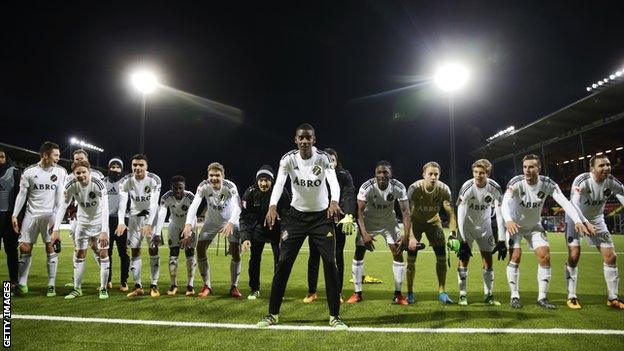
Isak made his professional debut with AIK in February 2016. Just 11 months later he was on his way to Dortmund.
If Ibrahimovic is flamboyant, outspoken and covetous of the public eye, Isak is calm, modest and down to earth. He is a softly spoken guy who tries to avoid the media. He is far more interested in playing the ball as efficiently as possible.
"What really stood out about Alexander was his maturity," says Nils-Eric Johansson, the legendary ex-AIK captain who played alongside Isak in his breakthrough 2016 season.
"There are many talented young players, but they usually need time before learning to connect with each other and play like a team. Isak was just 16, but played like a 26-year-old. That was absolutely remarkable.
"Zlatan wants to make a show; Isak doesn't. He is exactly the same on and off the pitch. Maybe some arrogance could actually have helped him."
Aftonbladet journalist Kristoffer Bergstrom adds: "Isak's attitude and style stood out. He wasn't exceptionally fast and his shots were not especially powerful, but he read the game better than anyone. He never dribbled just to show off. Everything he does is for a reason. His game is very efficient."
Isak's talent was impossible to ignore and he was already being lined up for a move abroad just 11 months after his senior debut. It is perhaps easy to understand why he did not join Real Madrid and signed for Borussia instead.
The misadventures of Martin Odegaard, the Norwegian midfielder who joined Real in 2015 at the age of 16 only to be unfairly labelled as a failure, might well have been on Isak's mind when he made his choice. They were team-mates for a time at Real Sociedad when Odegaard - now the Arsenal captain - was on loan from Madrid.
"I had some offers on the table but thought Dortmund was the right place for me to develop as a young player," he explained in his first interview in Germany. "I want to make the next step, get some playing time and hopefully help the team."
However, what looked at first glance like a very smart decision soon proved otherwise. He spent two years at Dortmund, during which time the club went through four coaches. None of them trusted the young Swede.
Thomas Tuchel, Peter Bosz, Peter Stoger and Lucien Favre preferred other options, and the youngster only took part in five Bundesliga matches - four of them as a late substitute. Eventually, during the second half of 2018, Isak was demoted to the reserve team in the fourth tier.
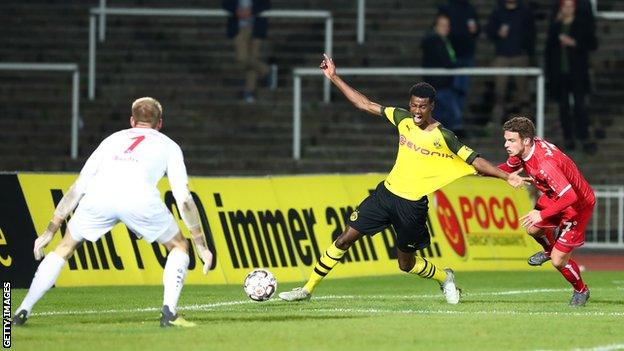
Last season, Isak was playing in Germany's semi-professional fourth tier, before moving to the Netherlands on loan
"It's kind of a mystery that has never been explained," Spox journalist Jochen Tittmar says. "Nobody knows why Isak didn't get a chance at a club that is so well known for promoting young players.
"Tuchel, who was in charge when he signed, admitted that he wasn't involved in the transfer and didn't know the player well, so it was strange from the start. It's hard to think of other examples of players who were discarded at Dortmund, but then went on to flourish elsewhere."
Imagine Ibrahimovic in such circumstances. There might well have been big headlines and angry quotes would on a daily basis. Isak was silent. Even now he doesn't have a single bad word to say about Dortmund. "I didn't have a lot of time on the pitch, but I became a better player," he said in a Mundo Deportivo interview., external
Amos Pieper has some insight into the Dortmund mystery - and how Isak dealt with it. The young centre-back played alongside the Swede for Dortmund's reserves and is now excelling with promotion-chasing Arminia Bielefeld in Germany's second division.
"Everyone saw that Alexander is a fantastic player - he's good with both feet, possesses amazing technique, is strong and fast. We expected that he would get an opportunity for the first team," he says.
"He was unfortunate to miss scoring chances in the only Bundesliga game he started. The 2017-18 season wasn't easy for the club, and it's tougher for young players when things aren't going smoothly. He wasn't happy with the situation, but never spoke about it. He just worked very hard, and usually stayed late to work even more after training. He was very focused and serious."
Such patience was eventually rewarded when Isak was loaned out to Willem II in early 2019. He instantly made his mark, scoring 13 goals in 16 Eredivisie matches and helping the modest club to reach the cup final, where they lost to Ajax. Success didn't change his attitude.
"It was a historic season for Willem II, and Isak was the poster boy for that," says Dolf van Aert, a Dutch journalist who interviewed Isak for Voetbal International., external
"He was not arrogant or flamboyant at all. He told me comparisons to Zlatan don't interest him."
Jordens Peters, the long-serving Willem II captain, describes Isak as "confident in a positive way". He adds: "The club had just sold star striker Fran Sol to Dynamo Kiev, and the new loanee needed to fill his shoes. It was immediately obvious that he would help us a lot.
"He can fit into any system. Good when you play possession football, good for counter-attacks as well. He can finish with both feet, most of his shots are on target and he clearly possesses killer instinct. He's relaxed during matches, and it looks like he doesn't feel any pressure.
"He is a quiet guy, but after a while he was part of the group in the dressing room. He enjoys jokes just like everyone else."
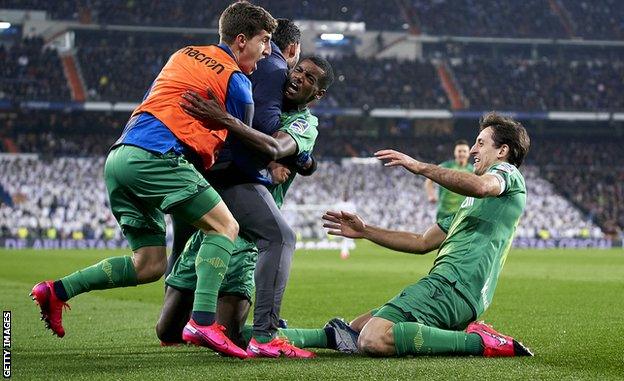
Isak has scored 14 goals in 31 appearances for Real Sociedad this season
And yet, even that brilliant spell in the Netherlands didn't change Dortmund's mind. The German club didn't plan on using Isak, so they sold him to Real Sociedad in the summer of 2019 for a reported 7.5m euros (£6.4m) - a lower fee than the 8.6m euros (£7.4m) they paid AIK in 2017.
With Norwegian wonderkid Erling Haaland becoming a sensation and since moving on to Manchester City, the Bundesliga side are unlikely to have regrets, but they missed out on a superb player who could have become a major star at Westfalenstadion, and failed to make a profit on him.
Isak signed a five-year contract at Real Sociedad with a release clause of 70m euros (£60m) that also included a buy-back option for Dortmund - set at 30m euros (£25.7m) - but that scenario was irrelevant as far as Isak was concerned.
"Dortmund is my past, and not my future. The Spanish league suits me and my playing style," he told Mundo Deportivo while at La Real.
Even in that respect he is the opposite of Ibrahimovic, who only spent one season at Barcelona, while Isak racked up 44 goals in 132 appearances over three years in the Basque Country.
The forward also helped secure three top-six finishes in his time in La Liga and was the Copa del Rey's top scorer as Real Sociedad won the competition in his first season there.
Repeat a similar trick at St James' Park and he will go down in Newcastle folklore.
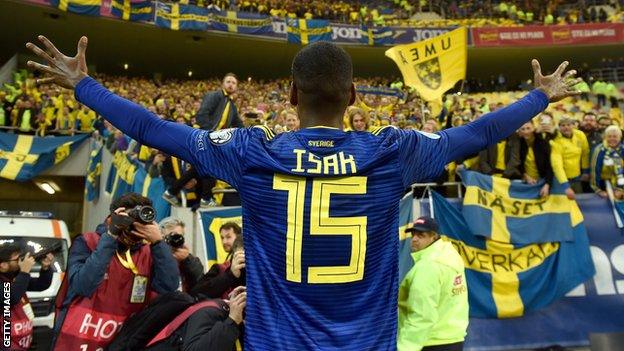
Isak became Sweden's youngest goalscorer at 17 years, three months and 22 days in a 6-0 win over Slovakia in January 2017